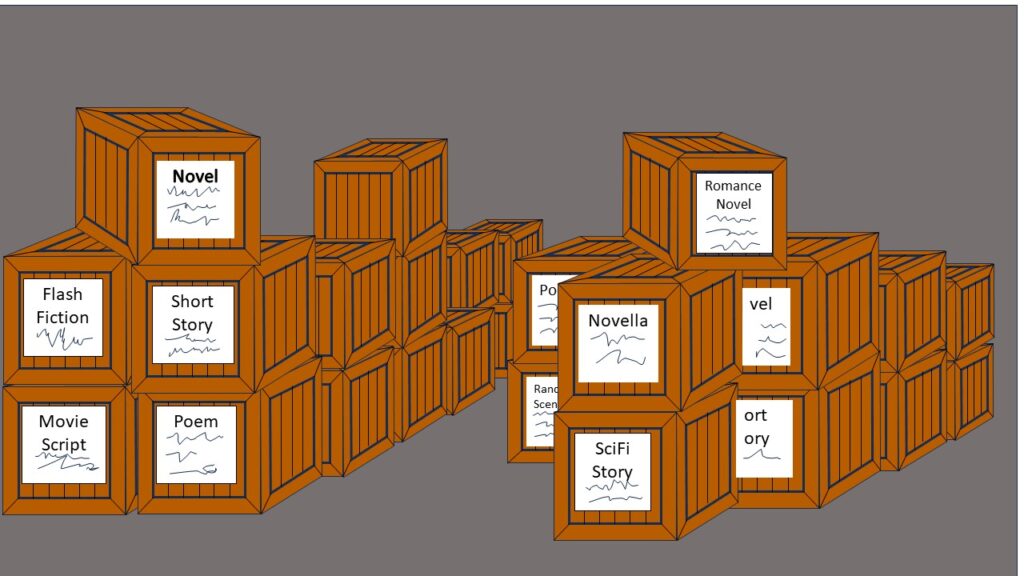Today we visit a warehouse, a dark and dusty place of vast dimensions. Innumerable cobwebs stretch between wall and ceiling. Hundreds, maybe thousands, of crates stand stacked in utter disorder. We’ve entered the warehouse of your unwritten stories.
Most writers don’t suffer from a lack of ideas. Story ideas spring up all the time, born from new experiences, fresh acquaintances, travels, chance meetings, TV shows, daily life, other writers’ books—from everywhere. Many authors scribble these ideas or tap a note on their phone and save them in a file for later use. Let’s picture that file as a warehouse, into which more crates accumulate every day.
What happens to the items in there? On rare occasions, I venture into my warehouse, open an interesting crate, and write the story. Infrequent, but it happens. Most of the crates remain there, unopened, unexamined, gathering dust. I suspect your warehouse looks much the same.
In this helpful post on LifeHacker, writer Nick Douglas provides several methods of dealing with all these unused ideas. He doesn’t use the warehouse metaphor—he calls the phenomenon ‘Idea Debt.’ I’ll summarize his options here, in my own words, but I encourage you to read his post.
Mr. Douglas’ approach presupposes that you’ve rummaged through your warehouse, become overwhelmed, and fled in despair. So many good story ideas, so little time. Douglas’ steps represent a way to assess the warehouse inventory, sort it, and reduce the backlog.
- Shrink and Submit. Some of the best and most time-sensitive ideas might lend themselves to this method. Look at the idea and imagine the smallest viable product you can make from it. If you originally saw it as a novel, consider a short story, even flash fiction. Look for a way to turn it into a written product quickly, and get it done and submitted. Sure beats letting it linger in the warehouse.
- Add to WIP. The smaller ideas, maybe just character sketches or scenes without a plot, could work here. Examine the idea for inclusion into your current work in progress. If it fits, presto, you’ve reduced some clutter already.
- Gift It. Still have a lot of crates in the warehouse? Some you’ll gaze at, thinking, ‘I’ll never find time to write that,’ or ‘I’m not the one to write that.’ Maybe you know another writer who could use it. Give it to that writer. That’s how I ended up writing After the Martians. Another author gave the idea to me. Douglas also suggests you could post your idea/gift on social media as a giveaway.
- Give Them Away. Looking around, you still see way too many crates. Face it, you’re never going to get around to most of them. The one-at-a-time process of gifting in step 3 would take forever. Time to break out the forklifts, load up the semi-truck, drive to the center of town, and dump the crates by the side of the road. In other words, gather the ideas in one long list and post the list on an open forum for others to use.
- Manage the Remainder. What’s left in the warehouse now? Only those ideas that can’t be shrunk, won’t fit in your WIP, and are too valuable to give away. For those, you must become a disciplined project manager (or use an app that helps you become one). Writing those stories is now your next project. Set goals, organize the work, break it down into tasks, schedule and accomplish the tasks. Get those stories written and submitted.
Wow! Your warehouse is empty, thanks mostly to Nick Douglas and, in lesser degree, to—
Poseidon’s Scribe


Some of us have warehouses that look a bit like Warehouse Thirteen . . .
Yeah, might not want to open those crates!